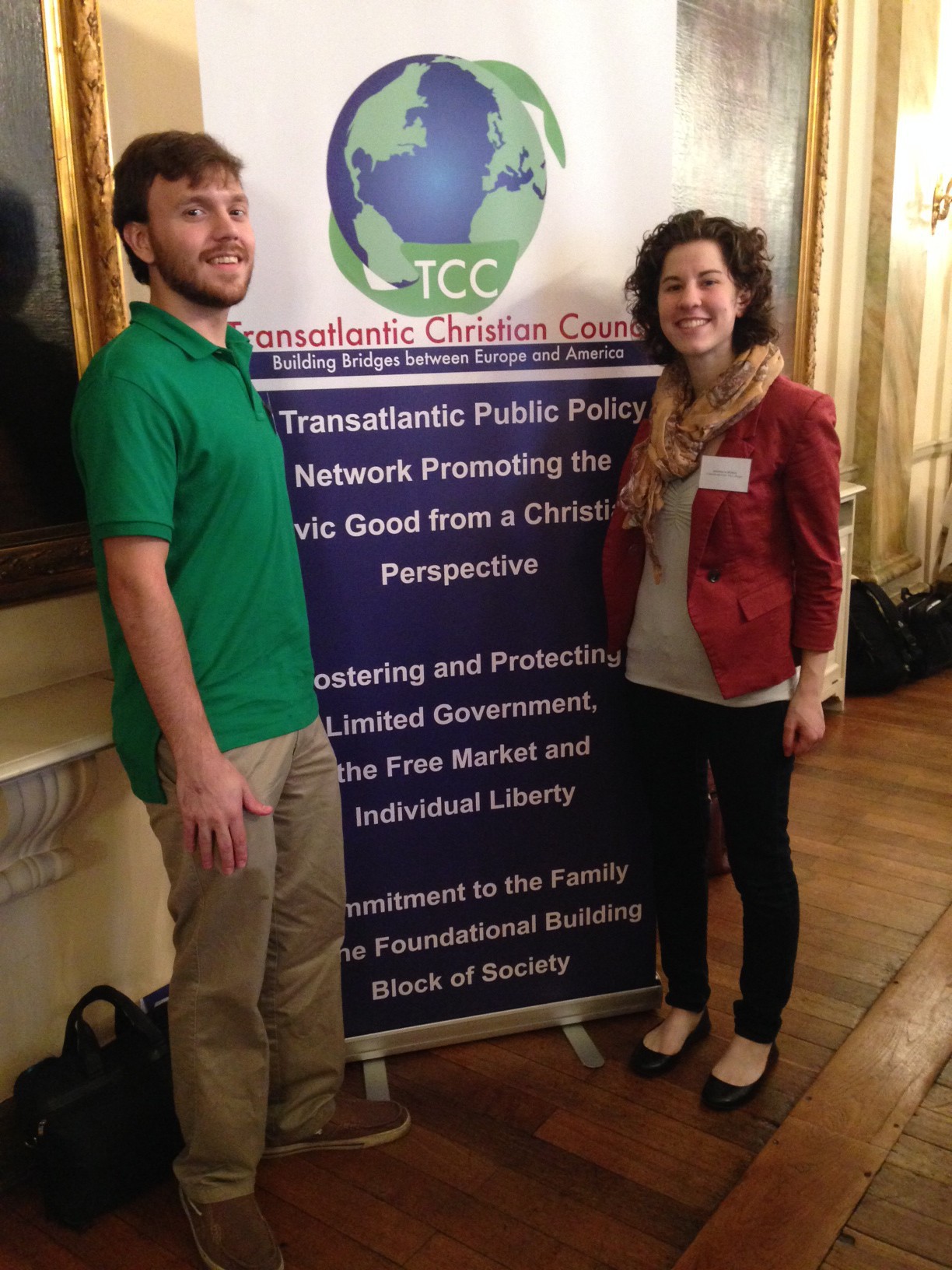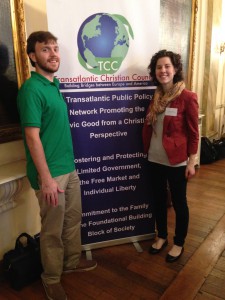
Last week, an exciting new organization called the Transatlantic Christian Council (TCC) hosted its inaugural conference. The theme of the conference was “Sustaining Freedom”, which aligns well with the Council’s mission “to develop a transatlantic public policy network of European and North American Christians and conservatives in order to promote the civic good, as understood within the Judeo-Christian tradition on which our societies are largely based.”
What I find most exciting about this Council, for which I commend Todd Huizinga and Henk Jan van Schothorst on their vision and initiative in founding, is this: like the Acton Institute, the TCC is not exclusively devoted to just one aspect of life, but rather aims to provide a forum for conversation on a broad range of life’s many important and fundamental human questions.
The starting point for these conversations is with a basic concept of human dignity. This concept is rooted in an openness to the idea of man as an image of God — endowed with the capacities for willfulness and reason, a creature and a sub-creator. And it is this understanding of the human person that serves as a point of departure for working through all sorts of interesting questions of politics, economics, liberty, government, religion, and family.
When I mentioned to a friend that I would be travelling to Belgium for this conference, he said to me: “Be sure they don’t euthanize you and harvest your organs!”
“Well,” I thought to myself, “that’s certainly a novel way to wish someone a good trip.”
Convening in Brussels for a daylong conversation on Christianity and secularism across North America and Europe provided an interesting context to discuss all sorts of current affairs in the light of the Judeo-Christian tradition.
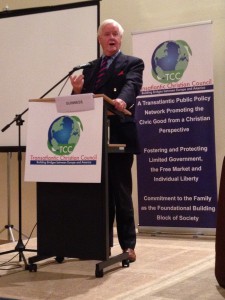
Anna Zaborska, a Member of European Parliament and John O’Sullivan, Editor-at-Large at the National Review each gave a welcoming address. Then, author and social critic Os Guinness delivered a keynote on “Sustainable Freedom” discussing the historical experiences and philosophical expressions of freedom throughout Western civilization.
One of the excellent things about this conference was the clear interplay between theory and practice. Participants thought reflectively about fundamental questions as they apply to every day life in the public sphere. There were three panel discussions including: “Human Rights and Human Nature,” “Religious Freedom: The Most Foundational Freedom under Threat,” and “The Moral Case for Free Markets.”
The first panel, “Human Rights and Human Nature” reminded me of Edmund Burke’s discussion of human rights as “incapable of definition, but not impossible to be discerned.” The panelists and participants grappled with the tension between individual and group rights, the challenges of defending the primacy of the right to life as the indispensable condition for all other rights, and the problems of the absence of an account of where human rights come from in such documents as the United Nations’ Universal Declaration of Human Rights.
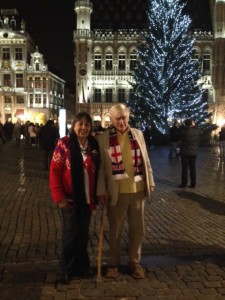
The “Religious Freedom” panel was moderated by Eric Teetsel, Executive Director of the Manhattan Declaration. This declaration is an effort to “take a stand” on the sanctity of life, the dignity of marriage, and religious liberty. Other topics discussed by the panel included: homeschooling, anti-discrimination laws, school prayer, human rights commissions, multiculturalism, pluralism, healthcare, among others. The conference participants included Peter and Hazelmary Bull, a Christian couple from the United Kingdom, who just recently lost a Supreme Court case over their refusal to host a gay couple at their Bed & Breakfast. Their presence and testimony at the conference motivated us to consider the tension between matters of conscience and conventions of society by evaluating this particular case of religious accommodations clashing with literal accommodations.
This reminded me of Pope Emeritus Benedict’s Apostolic Exhortation in which he says that “religious freedom is the pinnacle of all other freedoms” and “includes the freedom to choose the religion which one judges to be true and to manifest one’s beliefs in public.” This is then followed by the statement: “The truth cannot unfold except in an otherness open to God, who wishes to reveal his own otherness in and through my human brothers and sisters. Hence it is not fitting to state in an exclusive way: ‘I possess the truth’. The truth is not possessed by anyone; it is always a gift which calls us to undertake a journey of ever closer assimilation to truth. Truth can only be known and experienced in freedom; for this reason we cannot impose truth on others; truth is disclosed only in an encounter of love.”
There were continual affirmations of the practical challenges of competing “first” principles in everyday politics. Some topical stories discussed included “Where St. Nicholas Has His Black Pete(s), Charges of Racism Follow” and “Abstract Christmas tree sparks protests in Brussels.” Are holiday traditions preventing liberal progressive visions for society? Or, do accusations of discrimination constitute an attack on religious freedom by secularists? These questions surrounding current events provoked stimulating question and answer periods throughout the conference.
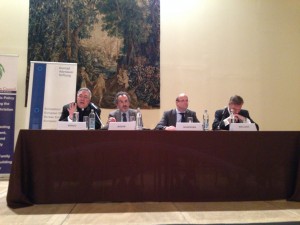
The final panel on “The Moral Case for Free Markets” was moderated by Acton Institute President Father Robert Sirico who recently wrote the book by a similar title, Defending the Free Market: The Moral Case for a Free Economy. Father Sirico began, as he usually does, asking: Who is the human person who has the right to be treated in a particular way? What is man’s distinct place in creation? How do human persons accomplish their nature and fulfill their very being by their actions in the world, according to the facts and conditions of existence in which they live? Continuing to think philosophically about the nature of the human person with respect to freedom, we can also ask: Who is the human person who is worthy of freedom and what sort of freedom is due to human persons according to their dignity and their nature?
Sustaining freedom seems to involve a prudential mix of liberty and restraint. This is the principle of ordered liberty, given a good defense in Samuel Gregg’s book On Ordered Liberty. As Edmund Burke says, “To make a government requires no great prudence. Settle the seat of power; teach obedience and the work is done. To give freedom is still more easy. It is not necessary to guide; it only requires to let go the rein. But to form a free government; that is, to temper together these opposite elements of liberty and restraint in one consistent work, requires much thought, deep reflection, a sagacious, powerful, and combining mind.”
The Inaugural Conference of the Transatlantic Christian Council gave participants the opportunity to grapple together with all sorts of interesting and meaningful questions and controversies. Thank you to those who provided this opportunity.
To learn more about the TTC, you can visit their website and “Like” their Facebook page.
